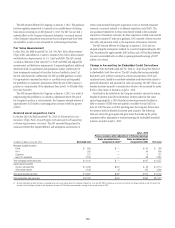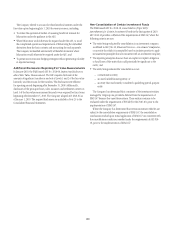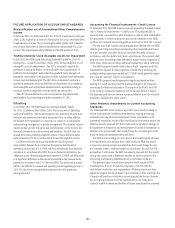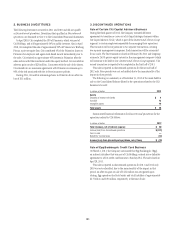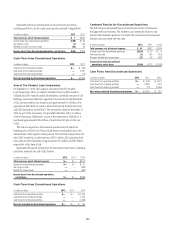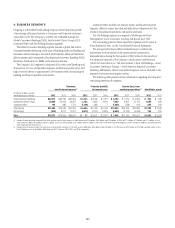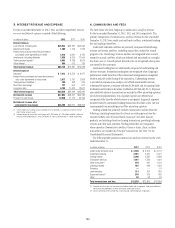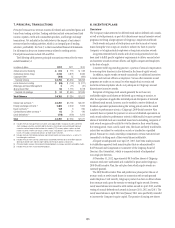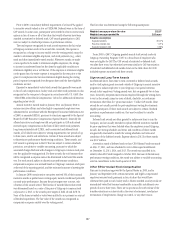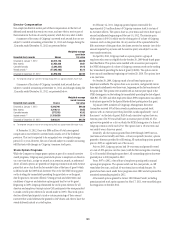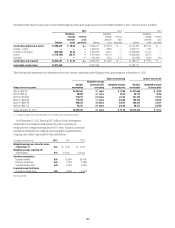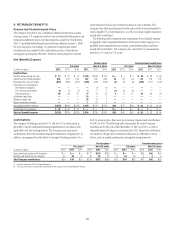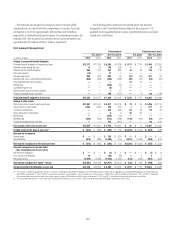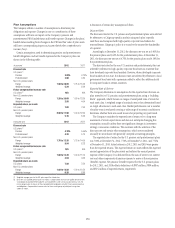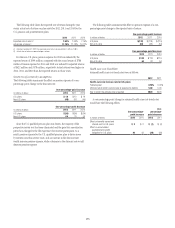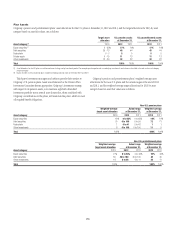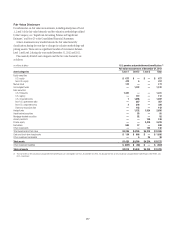Citibank 2012 Annual Report Download - page 189
Download and view the complete annual report
Please find page 189 of the 2012 Citibank annual report below. You can navigate through the pages in the report by either clicking on the pages listed below, or by using the keyword search tool below to find specific information within the annual report.
167
Prior to 2009, a mandatory deferral requirement of at least 25% applied
to incentive awards valued as low as US$20,000. Deferrals were in the form of
CAP awards. In some cases, participants were entitled to elect to receive stock
options in lieu of some or all of the value that would otherwise have been
awarded as restricted or deferred stock. CAP awards granted prior to 2011
were not subject to clawback provisions or performance criteria.
The total expense recognized for stock awards represents the fair value
of Citigroup common stock at the award date. Generally, the expense is
recognized as a charge to income ratably over the vesting period, except for
awards to retirement-eligible employees, and stock payments (e.g., salary
stock and other immediately vested awards). Whenever awards are made
or are expected to be made to retirement-eligible employees, the charge
to income is accelerated based on the dates the applicable conditions to
retirement eligibility are or will be met. If the employee is retirement eligible
on the grant date, the entire expense is recognized in the year prior to the
grant. For employees who become retirement eligible during the vesting
period, expense is recognized from the grant date until the date eligibility
conditions are met.
Expense for immediately vested stock awards that generally were made
in lieu of cash compensation (salary stock and other stock payments) is also
recognized in the year prior to the grant in accordance with U.S. GAAP. (See
“Other EESA-related Stock Compensation” below for additional information
regarding salary stock.)
Annual incentive awards made in January 2011 and January 2010 to
certain executive officers and other highly compensated employees were
administered in accordance with the Emergency Economic Stabilization Act
of 2008, as amended (EESA), pursuant to structures approved by the Special
Master for TARP Executive Compensation (Special Master). Generally the
affected executives and employees did not participate in CAP and instead
received equity compensation in the form of fully vested stock payments,
long-term restricted stock (LTRS), and/or restricted and deferred stock
awards, all of which were subject to vesting requirements over periods of up
to three years, and/or sale restrictions. Certain of these awards are subject
to discretionary performance-based vesting conditions. These awards, and
CAP awards to participants in the EU that are subject to certain clawback
provisions, are subject to variable accounting, pursuant to which the
associated charges fluctuate with changes in Citigroup’s common stock price
over the applicable vesting periods. For these awards, the total amount that
will be recognized as expense cannot be determined in full until the awards
vest. For stock awards subject to discretionary performance conditions,
compensation expense was accrued based on Citigroup’s common stock price
at the end of the reporting period, and the estimated outcome of meeting the
performance conditions.
In January 2009, certain senior executives received 30% of their annual
incentive awards as performance-vesting equity awards conditioned primarily
on stock-price performance. Because the price targets were not met, only
a fraction of the awards vested. The fraction of awarded shares that vested
was determined based on a ratio of the price of Citigroup’s common stock
on January 14, 2013, to the award’s price targets of $106.10 and $178.50.
None of the shares awarded or vested were entitled to any payment or accrual
of dividend equivalents. The fair value of the awards was recognized as
compensation expense ratably over the vesting period.
This fair value was determined using the following assumptions:
Weighted-average per-share fair value $22.97
Weighted-average expected life 3.85 years
Valuation assumptions
Expected volatility 36.07%
Risk-free interest rate 1.21%
Expected dividend yield 0.88%
From 2003 to 2007, Citigroup granted annual stock awards under its
Citigroup Ownership Program (COP) to a broad base of employees who
were not eligible for CAP. The COP awards of restricted or deferred stock
vest after three years, but otherwise have terms similar to CAP. Amortization
of restricted and deferred stock awards shown in the table above for 2010
included expense associated with these awards.
Sign-on and Long-Term Awards
As referenced above, from time to time, restricted or deferred stock awards,
and/or stock option grants are made outside of Citigroup’s annual incentive
programs to induce employees to join Citigroup or as special retention
awards to key employees. Vesting periods vary, but are generally two to four
years. Generally, recipients must remain employed through the vesting dates
to vest in the awards, except in cases of death, disability, or involuntary
termination other than for “gross misconduct.” Unlike CAP awards, these
awards do not usually provide for post-employment vesting by retirement-
eligible participants. If these stock awards are subject to certain clawback
provisions or performance conditions, they may be subject to variable
accounting.
Deferred cash awards are often granted to induce new hires to join the
Company, and are usually intended to replace deferred incentives awarded
by prior employers that were forfeited when the employees joined Citigroup.
As such, the vesting schedules and terms and conditions of these awards
are generally structured to match the vesting schedules and terms and
conditions of the forfeited awards. Expense taken in 2012 for these awards
was $147 million.
A retention award of deferred stock to then-CEO Vikram Pandit was made
on May 17, 2011, and was scheduled to vest in three equal installments
on December 31, 2013, 2014, and 2015. The award was cancelled in its
entirety when Mr. Pandit resigned in October 2012. Because of discretionary
performance vesting conditions, the award was subject to variable accounting
until its cancellation in the fourth quarter of 2012.
Other EESA-related Stock Compensation
Pursuant to structures approved by the Special Master in 2009, and in
January and September 2010, certain executives and highly-compensated
employees received stock payments in lieu of salary that would have
otherwise been paid in cash (salary stock). Shares awarded as salary stock are
immediately vested but become transferrable in monthly installments over
periods of one to three years. There are no provisions for early release of the
transfer restrictions on salary stock in the event of retirement, involuntary
termination of employment, change in control, or any other reason.



